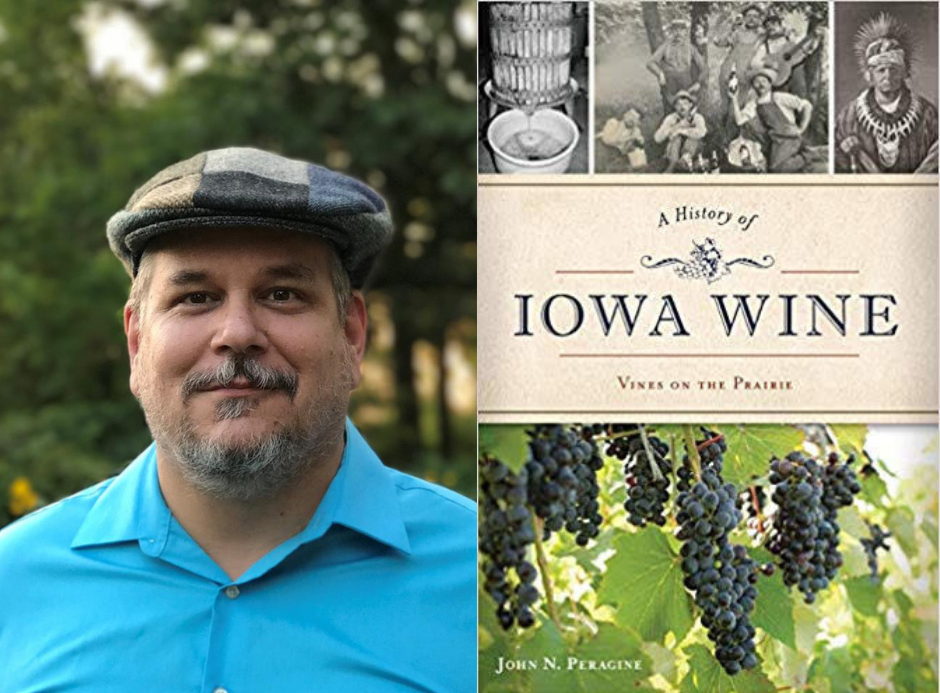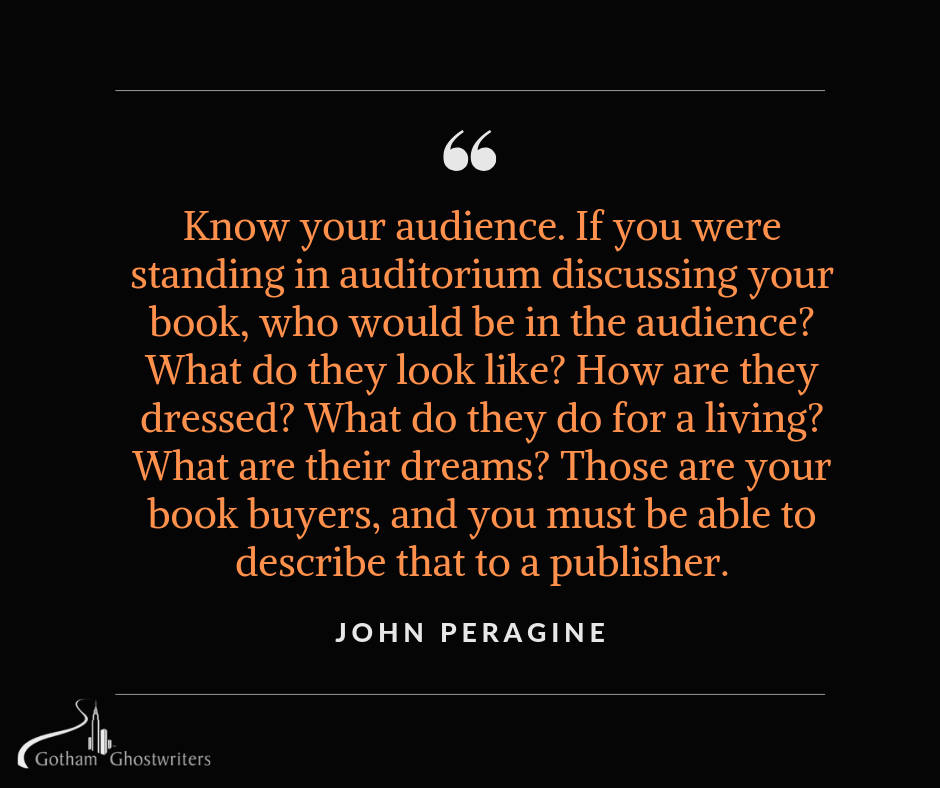John Peragine is the author of 14 books and has ghostwritten more than 100 others. He is contributor for Huffington Post, Reuters, and The Today Show. He covered the John Edwards trial exclusively for Bloomberg News and the New York Times. He has written for Wine Enthusiast, Grapevine Magazine, Acres USA, WineMaker magazine, and Writer’s Digest. He has been writing professionally since 2007, after working 13 years in social work and as the piccolo player for the Western Piedmont Symphony for over 25 years. Peragine is a member of the American Society of Journalists and Authors. His newest book, A History of Iowa Wine – Vines in Prairie (History Press) was released in April 2019. johnpwriter.com

Tell us about your publishing journey. How did you begin writing, and how did you break into the industry? When did you know you could make a career out of it?
I was a child protective services social worker in a small mountain community in North Carolina. To say I was burned out would be an understatement. I wrote an article about citrus wine for WineMaker magazine, and I think I made $150. I was hooked. I told my wife I was ready to write full time. She smiled and said, “I’ll give you 30 days. After that, you’ll have to go back to the full-time job with a paycheck and benefits.”
No pressure. In three weeks, I had my first book contract with a publisher. That was in 2007—you know, the year the economy was strong, and it was a good time to become an entrepreneur. I made it work and wrote eleven more books in the next few years. So, I guess that constitutes as a career.
Tell us what you can about your ghostwriting career. How did you get into that practice?
After a number of years of writing my own books, I had a number of people ask me for help with theirs. Coming from a 13-year career in social worker and mental health, I had a couple things going for me. First, I like helping people. For many authors, including myself, writing a book is one of the greatest accomplishments. I love it when someone calls me or sends me a pic when their box of books finally arrives. It is a pivotal moment that I enjoy knowing I helped them accomplish.
Second, I was good at listening. I had learned forensic interviewing as a social worker, and it has helped me not only as a ghostwriter, but as a journalist.
What special considerations are required for collaborating on a book?
Communication is essential. I am merely the pen; they are the author. I have to be in regular contact with my clients, even if it is to just do a check in. It helps the process move forward and keeps of us accountable for our part in the collaboration.
It’s essential that I click with a client. I am not the only ghostwriter on the planet, and I am not meant to work with just anyone. There must be a bond, a rapport built, in order to be successful. There is a high level of trust on both sides, as some of what is discussed is very personal.
Finally, I really do insist on meeting the client in person early in the process. I don’t know how to write as someone else if I have never met them. I learn so much about a person and the project by just spending a few days with them.
What’s the most important thing to know about the publishing process before you start pitching your work?
Two things. Know your audience. If you were standing in auditorium discussing your book, who would be in the audience? What do they look like? How are they dressed? What do they do for a living? What are their dreams? Those are your book buyers and you must be able to describe that to a publisher.
Second is have a plan for marketing. I try to remind clients that people who run publishing houses are business people. Their business is selling books and to make a profit. No matter how brilliant you are, or ground breaking your book concept is, without a proper plan, it will sit on a shelf and collect dust. That is no good for you, and a really bad business model for a publisher. I remind clients that there is one question that a publisher will want to know: How will you, the author, sell your book? There is no free lunch. You have to have an established audience and a plan for getting that audience to connect and buy your book.
How do you know if an idea—yours or someone else’s—is strong enough to develop into a book?
That is a tough question to answer, because if we knew what would sell, then we would all be rich. There are a few things that do increase your chances. One is that you have to have a well written book. Seems obvious, but a poorly written or edited book will wilt on the vine, and will follow a author forever. You are better off not writing a book, then to write a bad one. Take the time, get the help you need, and write an outstanding manuscript.
Second, it has to be original. It has to have a unique hook that will capture your audience’s attention. Everyone thinks their idea is original and great, but they often don’t do their homework. Do your due diligence and find other similar books and actually read them, and then decide if your book is unique enough to hold its own.
Do not ask your friends and family what they think. Ask professionals that don’t know you or your work. The best way I have found to do this is to go to writing conferences, or to reach out to others in your industry. Don’t ask them if they like it, send them 10 questions to answer about your idea or manuscript. You are bound to get more honest and helpful feedback.
What does your writing routine look like? How do you stay productive and overcome blocks?
It begins with coffee and ends with coffee. Writing is the blabbering on paper that occurs in between. I don’t sit for hours racking my brain though. Much of my writing is done in my head first. I come up with great ideas in the shower, or while playing a game. I give my brain a rest and ideas percolate. I quickly write them down.
I stay productive by setting daily goals of what I want to accomplish. I always put more than I could possibly do, and check things off as I go. The next day I make a new list. When I see the list in front of me, I know I want to get two or three things checked off before I check out.

What strategies do you focus on when cultivating your platform?
This goes back to some earlier questions. I have seen many authors overreach—they try to write a book that is outside their zone of expertise. They want the book to create a new persona for them in order to impress people to hire them. The problem is, they may not be an expert. Writing a book does not MAKE you an expert, it allows you to divulge your expertise.
You have to know what your expertise is, and begin there. For me, it is wine. I love drinking it. Talking about it. I know how to make it. And I have written a ton about it. Guess what my last four books have been about? Wine of course. I have increased my knowledge as I wrote them and learned a lot, but I still had a high level of understanding of the industry and the subject matter.
The books have done well, and I am passionate about writing and talking about it. I have involved other experts in the process—their tribe then becomes part of mine.
I also write a lot of articles about the subject before it comes out. Again, I am cultivating and growing a tribe—then I am not selling a book. The book sells itself.
If you could go back and change anything about your writing career, is there anything you would choose to do differently?
I would have accepted my value earlier. I undersold myself thinking that in some way if I charged less that I would build from there. What I found was that because I was undervaluing myself, my clients were also undervaluing what I was bringing to the project. If a person buys a beat up VW they treat it a lot different then a brand new Audi. The difference really is the perceived value—because they both run on the same gas, ride on the same roads, and get you to the same destination, but you treat them differently. I want to be the Audi.
What’s your best piece of advice for someone looking to be a full-time writer (ghosting or otherwise)?
Learn to network. Get out in the world and create relationships. That is where your work will come from—not your clips. People like to work with people they are familiar with and with whom they trust. People rarely ask what I have done when they hire me, they hire me because they believe I can help them and produce what I say that I will.
Also, invest in those relationships—don’t SELL yourself. Spend your time figuring out what you can do for them rather than what they can do for you.
What are you working on next?
I am ghosting a book of my former teacher who died and willed me the rights to his unpublished works. I am literally ghosting for a ghost.
***
